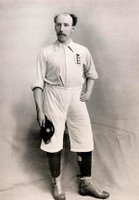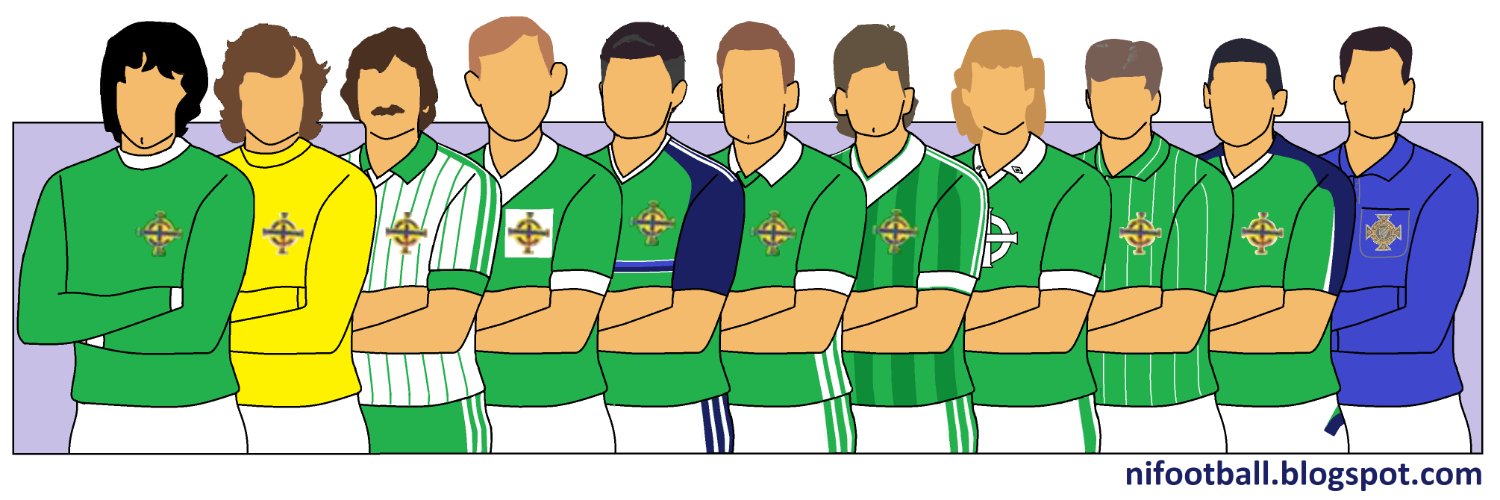 Famous as the only player to represent both Ireland and England, Jack Reynold's career is a prime example of how fleeting football fame and fortune can be...
Famous as the only player to represent both Ireland and England, Jack Reynold's career is a prime example of how fleeting football fame and fortune can be...Name: John Reynolds
Born: 21 February 1869, Blackburn (England)
Died: 12 March 1917, Sheffield (England)
Height: 5.04 ft
Weight: 9.07 st
Position: Half-Back
Representative Honours: Ireland: 5 Full Caps / 1 Goal (1890-91); England: 8 Full Caps / 3 Goals (1892-1897), Professionals (vs Amateurs, 1895); Football League: 4 Caps.
Club Honours: (with Distillery) Co. Antrim Shield Runner-Up 1889/90; (with Ulster) Irish League Runner-Up 1890/91; Irish Cup Runner-Up 1890/91; Charity Cup Runner-Up 1890/91; (with West Brom) FA Cup Winner 1891/92; (with Aston Villa) Football League Champion 1893/94, 1895/96, 1896/97; FA Cup Winner 1894/95, 1896/97.
Club Career:
Clubs
|
Seasons
|
Signed
|
Fee
|
League
|
FA Cup
|
Friendlies
|
|
Portglenone & Ballymena Schools
|
-
|
-
|
-
|
-
|
-
|
||
Park Road (Blackburn)
|
-
|
-
|
-
|
-
|
-
|
||
Witton (Blackburn)
|
-
|
-
|
-
|
-
|
-
|
||
Blackburn Rovers Reserves
|
84/85-85/86
|
1884
|
-
|
-
|
-
|
-
|
|
Blackburn Park Road
|
86/87
|
1886
|
-
|
-
|
-
|
-
|
|
East Lancashire Regiment
|
Dec-86
|
-
|
-
|
-
|
-
|
||
Distillery
|
87/88-89/90
|
May-88
|
-
|
*6/ 3
|
-
|
26/ 7
|
|
Ulster
|
90/91
|
Jun-90
|
-
|
12/ 6
|
-
|
23/11
|
|
West Bromwich Albion
|
91/92
|
Mar-91
|
-
|
17/ 2
|
7/2
|
-
|
|
Droitwich Town
|
91/92
|
1892
|
Guest
|
-
|
-
|
-
|
|
West Bromwich Albion
|
92/93
|
-
|
-
|
20/ 1
|
-
|
-
|
|
Aston Villa
|
93/94-96/97
|
Apr-93
|
£50
|
96/17
|
14/0
|
-
|
|
Celtic
|
97/98
|
May-97
|
Free
|
4/ 1
|
-
|
-
|
|
Southampton
|
97/98
|
Jan-98
|
Free
|
2/ 0
|
(Southern League)
|
||
Bristol St George
|
98/99-00/01
|
Jul-98
|
Free
|
(Birmingham & District / Western League)
|
|||
Roundel
|
01/02
|
-
|
-
|
-
|
-
|
-
|
|
Grafton
|
02/03
|
-
|
-
|
(New
Zealand)
|
|||
Stockport County
|
03/04
|
Sep-03
|
Free
|
1/ 0
|
-
|
-
|
|
Willesden Town
|
03/04-04/05
|
Oct-03
|
-
|
(London)
|
|||
Cardiff City
|
07/08
|
-
|
-
|
coach
|
|||
TOTALS
|
£50
|
152/27
|
21/2
|
49/18
|
|||
Biography:
Jack Reynolds was born in Blackburn, the son of a serving soldier who spent most of his youth until the age of 15 in various parts of Ireland between Birr, King’s County (near Dublin) and Ahoghill, County Antrim. He returned to Blackburn in 1884 and played for Blackburn Rovers' Reserves, then joined Blackburn Park Road. While there he scored the equaliser in a 2-2 English F.A. Cup draw with Cliftonville and also played in the 2-7 replay defeat in October 1886.
In December 1886 Reynolds joined the East Lancashire Regiment (known as the Lilywhites) and was posted back to Ireland, where he came under the notice of Distillery. He agreed to play for them in their English F.A. Cup match against his old club, Blackburn Park Road in Blackburn on the 8th October 1887, the trip home being too good to miss! The trip brought Jack to the attentions of the F.A. and he was issued with a one year suspension for illegally signing for Distillery.
In December 1889, while stationed at Newry, Distillery bought Reynolds out of the Army and he played for them in the F.A Cup on 7th December 1889 in a 3-3 draw with Linfield. He missed the 5-3 replay win, but was back in the team that traveled to Bolton in the First Round Proper on 8th January 1890 (lost 2-10). He scored in both F.A. Cup matches in which he played that season.
Reynolds’ few appearances for Distillery were enough for the IFA to select him to play for Ireland, and he played agaonst Wales and England later that season. The IFA were of the opinion that Jack had been born in Ireland with his long association there and his County Antrim accent. A supposition not contested by Jack. With Distillery he played in the 5-3 Co. Antrim Shield Final defeat by Linfield.
A move to Ulster FC the following season brought an Irish Cup runner-up medal (again following a defeat at the hands of Linfield), and three further caps. The second of these was against England at Wolverhampton on the 7th March 1891. At this match Jack secretly signed for West Bromwich Albion. Returning to Belfast he finished what was quite a successful season with Ulster.
The move to West Brom in 1891 led to his selection for England, and an end to his Ireland career. This episode also led to the scrapping of selection for another country after five years residence.
A right-half of infinite variety - fast, able with both feet, skilled in heading, a sure shot and presenting a difficult obstacle to his opponents. He was capped eight time by England from 1892-1897, making Reynolds the only player ever to represent both England and Ireland, and indeed for and against both teams in a full international. He was regarded as one of the great names of the 1890s.
Reynolds amassed an impressive medals collection whilst playing for both West Brom and Aston Villa (three F.A. Cups and three League titles). Of note is the fact that in 1892 he played (and scored) for West Brom when they beat Aston Villa 3-0 in the F.A. Cup Final, and in 1895 he played for Aston Villa against West Brom as the Final result was reversed. This remains a unique achievement.
In 1897/98 Reynolds turned out for both Celtic and Southampton, both of whom won their respective Championships (Scottish and Southern respectively), but really his career was on the wane. The remainder of his career was spent playing as a semi-professional, though he spent a spell coaching in New Zealand in 1902.
A real 'character', famous for his drinking and womanising, Reynolds appeared in court in 1899 for non-payment of maintenance for an illegitimate child. With his football career over, and any earnings frittered away, Reynolds worked in a colliery in Sheffield right up to his premature death in 1917.
"A remarkably smart half-back. For his inches a perfect wonder. Knew every 'trick of the trade', and usually showed up well in big matches. Had a happy knack of scoring at critical moments. Something of a roamer, he had the unique distinction of representing both Ireland and England in International matches. Had an eye to the humorous side of football."
The Villa News and Record 1 Sept. 1906
Wikipedia Article (includes further links)
England Football Online
Ireland Cap Details:
08/02/1890 Wales... A L 2-5 BC
15/03/1890 England. H L 1-9 BC 1 Goal
07/02/1891 Wales... H W 7-2 BC
07/03/1891 England. A L 1-6 BC
28/03/1891 Scotland A L 1-2 BC
Summary: 5/1. Won 1, Drew 0, Lost 4.
England Cap Details:
02/04/1892 Scotland A W 4-1
13/03/1893 Wales... H W 6-0 1 Goal
01/04/1893 Scotland H W 5-2 1 Goal
03/03/1894 Ireland. A D 2-2
07/04/1894 Scotland A D 2-2 1 Goal
06/04/1895 Scotland H W 3-0
29/03/1897 Wales... H W 4-0
03/04/1897 Scotland H L 1-2
Summary: 8/3. Won 5, Drew 2, Lost 1.
Additional statistics and biographical information by George Glass.

Comments